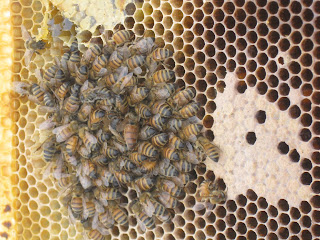I have gone from fifteen to two colonies in a matter of weeks. Three were gone before December. The other ten, according to notes all met their demise over the last week of December and first week of January.
I noticed one by one that no dead bees were being brought out to the landing board of the hive. I became more suspicious when I scraped out dead bees to keep lower entrances clear and neither heard or saw activity. On a warmer (above 30 degrees) day, I opened them up. In almost all the colonies I found a handful of bees on the comb with their queen right there in the middle of them, just frozen in time. Capped honey was on the frame and the deep super above them was full of capped honey.
What happened??? I don't have answers, I have theories. Theories that only lead to more questions.
I have helped other beekeepers in the spring with their dead out hives and there were LOTS of dead bees to clean up, piled on the bottom board and stuck into the combs. My hives did not look like this. Most had a handful of bees with their queen on the center bottom combs and a scattering of dead bees on the bottom board. For as strong as these colonies were in September, I am surprised to find so few bees. This is an odd finding.
I have had other beekeepers suggest that varroa mites "took over" in the fall and the majority of the bees just left. Maybe..... I did do brood breaks during the month of July to knock back the varroa naturally. I did not do a mite count in the fall. I wish now that I would have. That would have been (if counts were below threshold) one more piece of evidence to "prove" it was not Varroa. I have learned one thing throughout all this, I will do mite counts from now on.
Another theory is pesticide exposure. We had an extremely warm November, it was actually in the seventies. All my colonies were out flying and active. However, there was nothing blooming at this time. The Honeybees collect tree resin/sap at this time of year to make propolis. When crops are harvested, one can deduce that dust from the combining ends up in the tree sap. In this dust could be neonicotinoids, a specific group of pesticides which has been found to be harmful to bees. Because it was so warm this fall and I live in a very agricultural area, the bees would have collected a lot of this sap and been exposed. Mel Disselkoens book, "OTS Queen Rearing, A Survival Guide to Beekeeper Worldwide" cover this subject well. He states, "When the honeybee dies, pathologists can detect all kinds of viruses and bacteria to account for the manner of death but insecticidal injury is the actual cause of death because it destroys the immune and central nervous systems." This may explain why there were so few bees in the hive. If the central nervous system was affected, the bees would be disoriented and never return to the hive.
 |
| An example of one of the dead colonies. Queen is in the middle of the bees. This hive also had a super above with 10 frames of capped honey. |
 |
| A dead colony. This is all the bees I found except for a few on the bottom boards. Queen is in middle, more solid coloring. |
 |
| January 14, breaking down the dead colonies. Hauling hive bodies full of capped honey in the sled to the garage for storage. I will hopefully extract the honey soon, all 70 + deep frames of it. |

